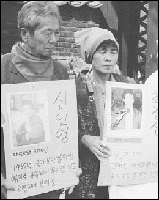|
|
| Director, Script, Photography, Editing: Kim Tae-il Producer: Kim Dong-won, MYNKAHYUP Production Company, Source: PURN PRODUCTION Cheonggang Bld.3F, Shindaebang 2 Dong, 343-5, Dongjak-gu, Seoul KOREA Phone: 82-2-823-9124 / Fax: 82-2-823-9125 KOREA / 1995 / Korean / Color / Video / 48 min |
Born in 1963. Currently lives in Korea. He started filmmaking through Independent Film Workshop in 1991 and directed several films including People Who Overcame the Division (95), A Mother's Purple Handkerchief (95), and Aging Grass Stays Greener When Together (96). His work focuses on the division of the Korean peninsula and the political and personal ramifications of the 38th parallel. He is currently working as a producer at Purn Production, an independent film company that tackles issues like re-unification, labor, prostitution, and environment. |
 |
|
| The title refers to the purple scarf worn by mothers of long-term prisoners of conscience in their weekly demonstrations in Seoul. No political slogans carry the same weight as footage of the reunion of a man with his mother after over 40 years in prison. | |
|
|
|
|
Director's Statement Through this film I wanted to raise the question of human rights
in Korean society. Our lives are still ruled by the turmoil of
contemporary history from the colonial liberation from Japan to
the division of the country. The unavoidable wall created by the
reality of our national anticommunism must be overcome. It is
not related to the pain brought about by the cause and context
of the division. I tried to describe these people's lives in the form of a documentary
but it was difficult to visualize their pain. With the wall of
division still in place, there were many things that could not
be fully expressed. |
|
